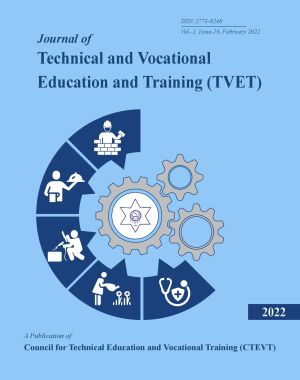Addressing Informal Skill Learners' Challenges in Skill Test in Nepal
DOI:
https://doi.org/10.3126/tvet.v1i16.45184Keywords:
Informal Skill Learners, National Skill Testing Board, recognition of prior learning, accreditationAbstract
In Nepal, more than eighty percent learners gain skills through work and experiences. The informal sector is dominant in the nation. If the skills acquired by the work and experiences are accredited through the testing authority, underemployment and underpayment can be addressed and decent employment and gainful income assured. The recognition of the informally learned skill will transform the path for the formal stream. Despite having the benefits of recognition of the prior learning and establishment of testing authority for forty-five years, the number of the informal skills learners appearing for the accreditation is not encouraging. In this context, this paper explains the challenges of the informal skill learners that encounter during the accreditation of their skills through the National Skill Testing Board. I came up with the qualitative research with seven participants, including informal skill learners and testing authority officials. As the informal skill learners explore the lack of information, awareness and orientation of the skill test system, the information provided must be clear, short, user friendly, precise and free from complexity. Similarly, the testing authority and informal skill learners shared that the skill-testing certificates are less valued by the employers during the recruitment.
Downloads
Downloads
Published
How to Cite
Issue
Section
License
© CTEVT All rights reserved
CC BY-NC This license enables reusers to distribute, remix, adapt, and build upon the material in any medium or format for noncommercial purposes only, and only so long as attribution is given to the creator.




